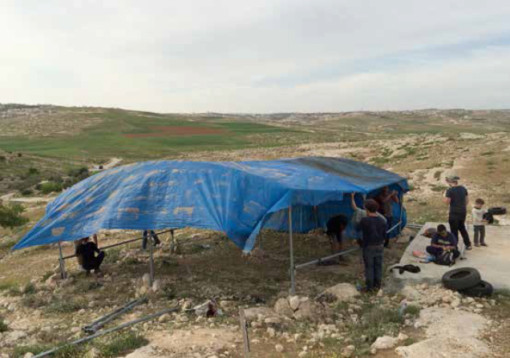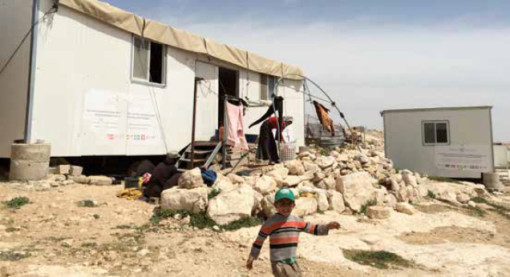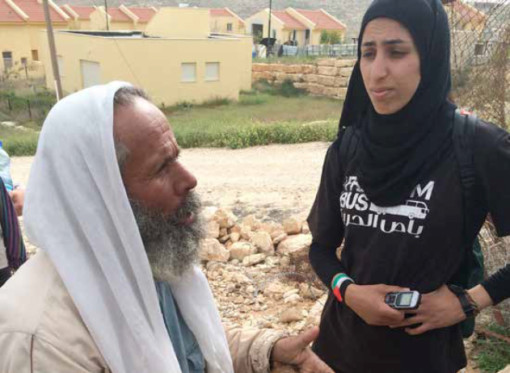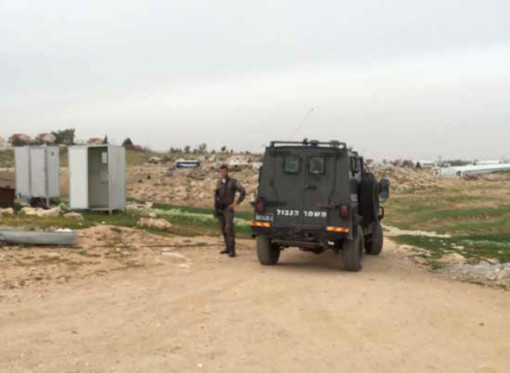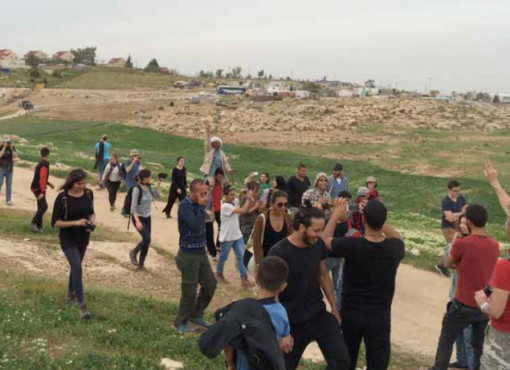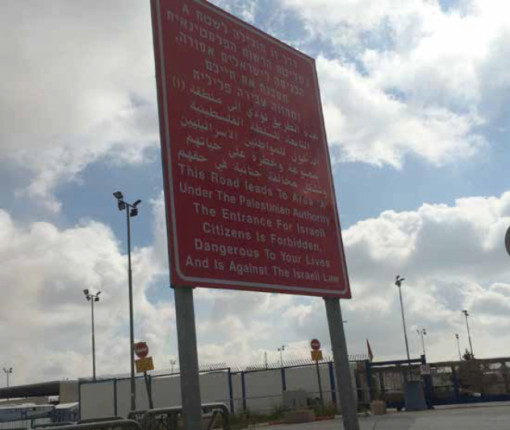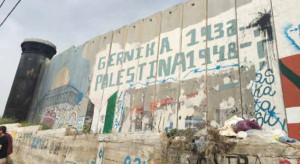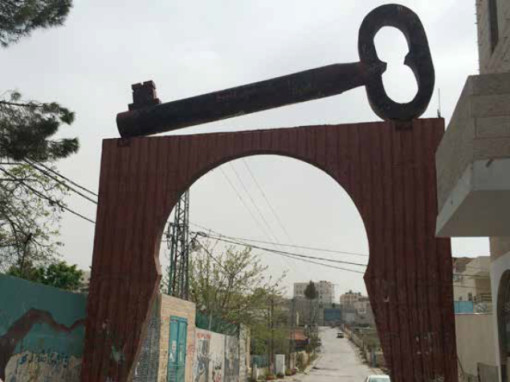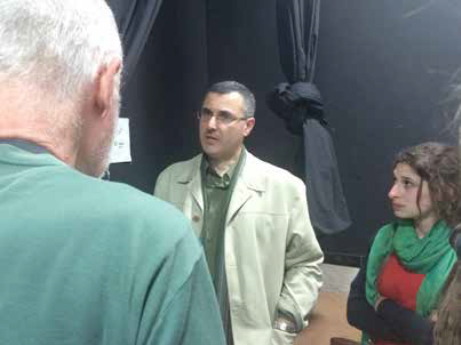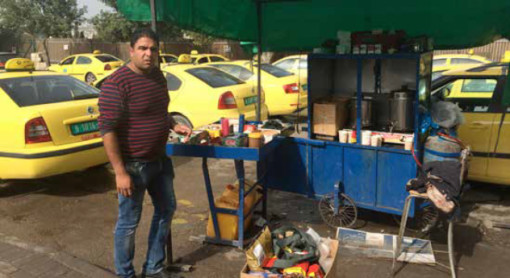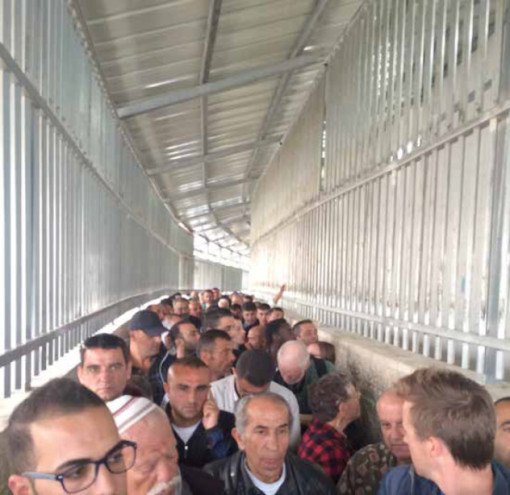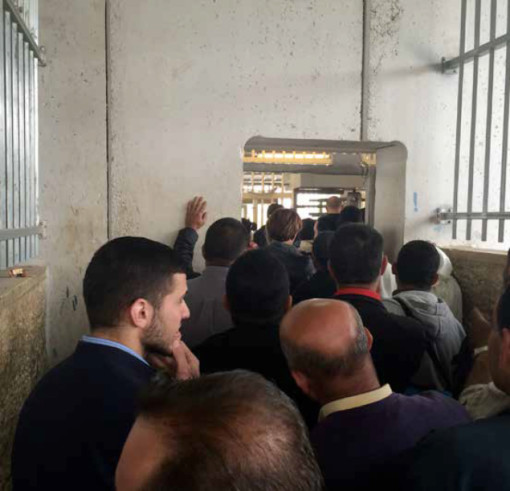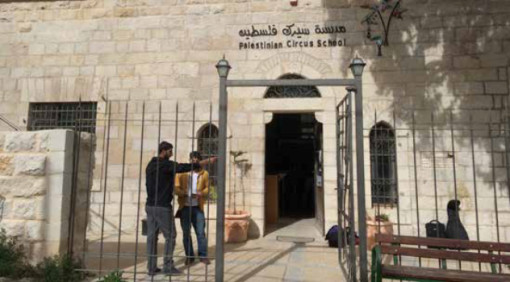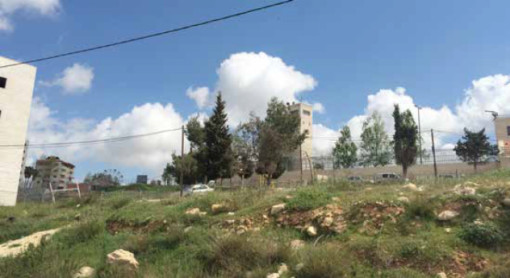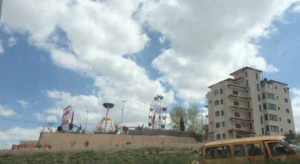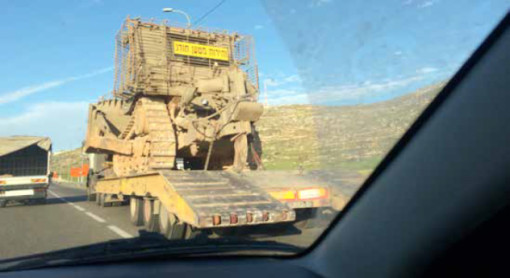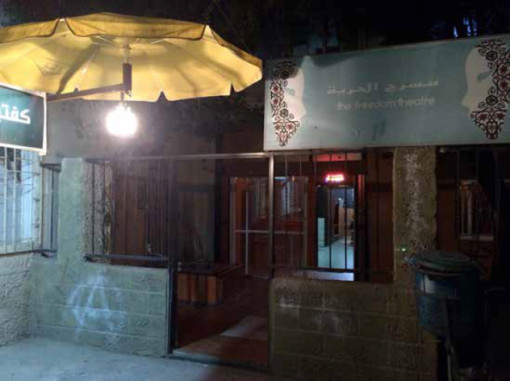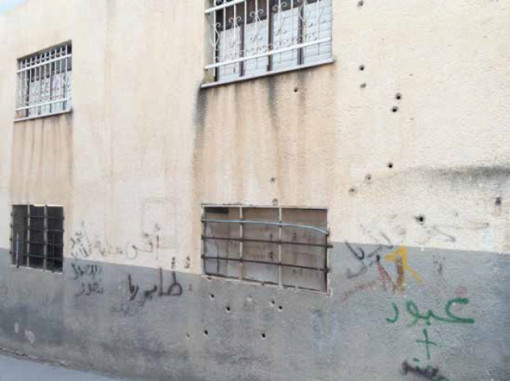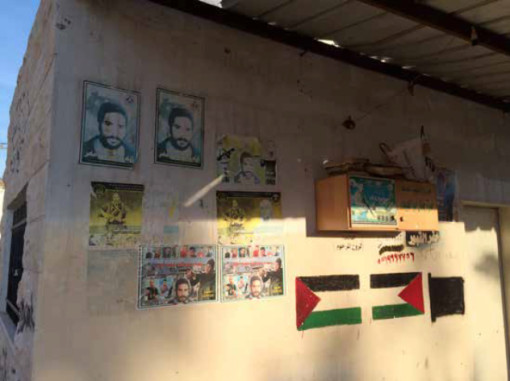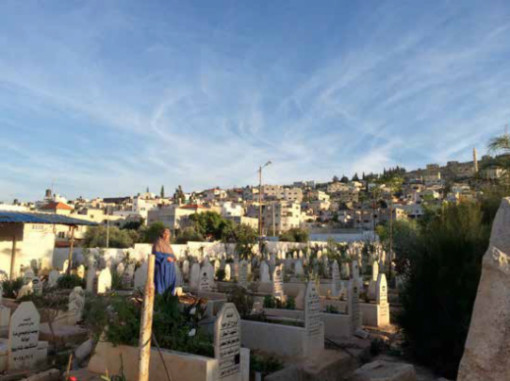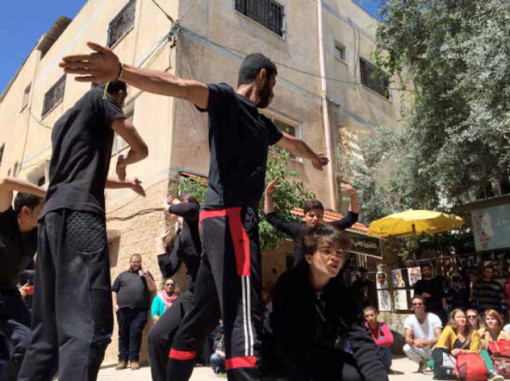‘I think you’ll find this interesting,’ said my friend handing me a CD. ‘It’s about a theatre in Palestine.’ This was in 2004. I began watching the grainy, pirated, low-resolution film not knowing what to expect. Within minutes, I was entranced by the film’s protagonist, an old Jewish woman called Arna. I watched, with horror, how one by one the kids who came to her theatre died a few years later during the Second Intifada. The building which housed the Stone Theatre was also demolished by Israeli tanks. And cancer consumed Arna. The film is directed and narrated by Arna’s son, Juliano Mer Khamis. The film raised disturbing questions about the limits of artistic endeavour under a brutal, colonial occupation.i What is the point of intervening with the arts, I thought, if the children one works with are going to take up guns and be killed? The film stayed with me for a long time.
Then, in late 2010, another friend, who had just returned from Palestine, told me about a theatre she had visited in the Jenin Refugee Camp in the West Bank. ‘Hang on, Jenin?’ I said. ‘That is where Arna worked!’ As it happened, the theatre my friend had visited was indeed set up by Juliano, and was called, in this avatar, The Freedom Theatre. I went online and read up what I could, and watched the little that was available on YouTube. ‘How cool it would be,’ I thought to myself, ‘if Janam could establish contact with them.’ Janam being Jana Natya Manch, the group I’ve been active with since 1987. I asked my friend to get me Juliano’s email id. It took her a while to get it, and then it took a while for me to write to him. Anyway, it was in mid-March 2011 that I wrote to Juliano, introducing Janam. Then, every day, I was checking to see for his response. None came. On 4 April, I was on Facebook, and a newsflash popped up on a friend’s timeline. ‘Israeli-Arab actor shot dead in Palestine,’ it said. My heart stopped beating. ‘Oh no, let this not be Juliano,’ I said to myself, and clicked the link. Tragically, it was.
Juliano’s killing catapulted The Freedom Theatre to international attention. I knew the feeling. Something similar had happened with Janam was attacked and our founder, Safdar Hashmi, killed, along with a spectator, in 1989. The loss of a charismatic, dynamic, visionary leader can be crippling and that void never fills, really. I felt like I knew exactly what those unknown comrades were undergoing in that faraway, walled-off land.
I immediately wrote an article about Juliano and The Freedom Theatre.iiHardly anyone knew of Juliano or the theatre then in India, and the article circulated widely. Janam organised a memorial for Juliano at the National School of Drama, New Delhi. I sent a link of my article and photos from the event to the Freedom Theatre website id, but didn’t really expect a response. They were in the midst of a devastating tragedy, and I could imagine that their inbox was deluged.
In November 2011, I was in Berlin on a Goethe Institut fellowship, and utterly unexpectedly, was introduced to a man they said was from The Freedom Theatre. He must have thought I was a total nutcase, because I started blabbering incoherently about Juliano, Safdar, TFT, Janam, whatnot. I told him I was trying hard to get the NSD to invite them to the international theatre festival in Delhi. That was not to happen. Partly because no one in the NSD was interested enough, and partly because the Palestinian Embassy in Delhi wasn’t going to put in that kind of money to get them over.
In the meanwhile, I had, by chance, got in touch with Ben Rivers. Ben is an Australian, who has been involved quite closely with The Freedom Theatre after Juliano’s killing. As luck would have it, Ben was coming to India, and we were able to work out for him an entire tour — he offered workshops to Janam and a number of other groups across the country, and also spoke about the Palestinian situation and the work of The Freedom Theatre at several places. This was in 2014.
In October 2014, Jonatan Stanczak, Managing Director of The Freedom Theatre, wrote to me saying they are sending the team to India for the theatre festival in Kerala. Would I be there? When I said no, he asked if some of the team members could come to Delhi and spend time with us. We were delighted! As the conversation progressed, we realised they had grand plans — they wanted to send their students to work with Janam in the winter of 2015-16, and to learn street theatre techniques.
After their visit to Delhi, it became clear to us that someone from Janam also needs to visit Jenin and see it all close up. It was decided that Komita Dhanda, Secretary of Janam, and I would visit Palestine in March-April 2015. We would be part of the Freedom Bus ride, and stay on for Juliano’s memorial. Unfortunately, Komita’s visa application was rejected (no reason offered). And thus it was that I found myself in Palestine, a land I had dreamt about all my life. Here’s what I experienced.
Thursday, March 26
The Stone Children
A school courtyard, a function, lots of noisy children, all the local notables — only men — sitting in the front row, a master of ceremonies speaking non-stop and loudly on the microphone, people speaking on their cell phones, the picture of the best-known nationalist leader on the podium. Noise, chaos, and the spirit of festivity in the air. The picture could’ve been Gandhi, and the school could’ve been anywhere in Delhi. But it isn’t. The picture is Yasser Arafat’s, and the school is in Atuwani in the West Bank in occupied Palestine.
It’s my first full day in Palestine. I arrived the previous evening and, in what was a bit of an anti-climax, was not asked a single question at immigration. Just waved through.
A friendly Arab, a cleaning man, lent me his phone when he found me struggling with the pay phones at the airport (none of them working) so I could call Jonatan, managing director of The Freedom Theatre (TFT). I took a shuttle bus to Jerusalem, where the woman sitting next to me was a British musician. She was very friendly, and we soon struck up a conversation. She’d heard of TFT, she said, of Juliano’s killing,and she said she’d try and attend the performance of ‘The Siege’ on April 4, Juliano’s memorial. From Jerusalem, I took a bus to Bethlehem. Among all the Arabs, it was a bit strange to see a Jew, black robes and hat and all, an old, bearded man, again very friendly. He was defying Israeli law by being there. From Bethlehem, I took a taxi to Beit Sahour.
Both Jerusalem and Bethlehem look like what you’d expect them to look like. Buildings of yellow limestone, exuding history. At some point during the ride from Jerusalem to Bethlehem, we drove past the Separation Wall. I learnt later that this section has a lot of graffiti and murals, including some by the British artist who goes by the name of Banksy, and whose real identity remains a closely-guarded secret. But it was dark and I couldn’t make anything out. These are pieces he had done on a visit to the West Bank some years ago. In 2015, Banksy managed to smuggle himself into Gaza, and he’s done some fabulous work there as well.
Micaela Miranda, director of the theatre school, picks me up in the morning. We also pick up Laura, a Finnish photographer, and drive to Atuwani, a small village in the south Hebron hills. The landscape is undulating and beautiful, dotted with Palestinian villages and Israeli settlements. The settlements are easy to make out. Not only are they fenced and guarded, they inevitably have sloping roofs, European style. The hill next to Atuwani, barely a kilometre or so away and clearly visible, has a settlement.
I am part of the Freedom Bus, an annual ride to different parts of the Occupied Territories by The Freedom Theatre which is based in Jenin. The ride has performances, community work, interactions with communities and meetings with resistance activists. This year, a number of TFT theatre school students are part of the ride, along with many ‘internationals’, as we are called. I am pretty sure I’m the first Indian to be part of this.
We arrive in Atuwani in the middle of a school function. Children are performing, the students who are finishing school are dressed in black graduating cloaks, the women in the audience are wearing traditional Palestinian dresses. After the function, TFT and local students break out into dance while the women lay out the tables. The food is simple and non-spicy. Having grown up with the easy association we make between Arabs and meat, I am actually surprised to find that the entire menu is vegetarian. I admonish myself mentally: ‘Stop stereotyping!’
After lunch, we split into two groups to do community work. The group I’m in has to build a tent on the hill facing the settlement. Some of the children from Atuwani go to a school in the neighbouring village, but they have to go past the Israeli settlement to do that. Since they are often attacked or threatened by vigilantes from the settlement, the Israeli army (Israeli Defence Force or IDF) escorts them. The tent will give children some shade as they wait for the IDF jeep which his often late. Sometimes it doesn’t come at all.
About a dozen of us internationals take a couple of hours to build the tent. Afterwards, I amble across to the top of the hill, from where you can see the settlement clearly. The settlement has annexed a cherry tree orchard that was on Atuwani land. I can see the orchard in full bloom. Neruda’s line comes to me: ‘I want to do to you what the spring does to the cherry tree.’ A bunch of Palestinian boys are on the hill with me, as are Micaela and an American activist. Micaela informs us that the boys are planning a raid across the dirt road, towards the settlement, to pick the sweet fruit that grows on a particular cactus. A white vehicle arrives, and the boys scurry back to safety. This is the vehicle of the civilian authority which tracks the security of the settlement. Soon, an armoured IDF jeep arrives. Sometimes, I learn, the children throw stones at the vehicle. Stone throwing, for the Israelis, equals shooting, and the children can be severely punished and imprisoned for it. Today, the boys stand defiantly on the hill top on our side, refusing to be cowed down. This cat and mouse game goes on for a while till the army jeep finally goes away. The boys run down the hill, cross the dirt road, and climb up the hill all the way to the electrified settlement fence to pick the cactus fruit. Some of them even climb across the fence that encloses the cherry orchard. They work furiously for about ten minutes and are back safe and sound. I have no doubt the fruit will be all the sweeter because it is the fruit of defiance.
Welcome to the occupation. Welcome to the resistance.
Dinner consists of a lentil soup, a salad of cucumber, tomato and Shimla mirch, and thick Palestinian roti. After dinner, there are short talks by local activists. We learn that earlier in the day, probably as we were building the tent, a couple from Atuwani was accosted by some settlers. Fortunately they weren’t harmed, but they were viciously abused, leaving the woman considerably shaken. The activists speak about how the settlement has changed their life. At some point, the village organized itself and got their plots and homesteads registered. This was a smart move, because it now provides them with a modicum of legal protection against encroachments by the settlers. But of course, there is no permanent protection, and the seeming serenity of daily life is anything but that. It is, at best, a fragile state of passive violence.
We are also to be shown a documentary film about the wall, but the computer hangs after about 10 minutes. Later, a smaller group of internationals, TFT students and one of the local activists discuss the current state of the resistance, the problems inherent in NGO activism which becomes a ‘career path’, the changing tactics of the occupation itself. ‘I lived in Jenin for nine months,’ says a young American woman, ‘and not once did I see any direct violence or arrests. They all happened at night, when I was asleep’. The discussion turns to memories of the First and the Second Intifada, and the role of theatre in the resistance. Micaela talks about a TFT play about Atuwani directed by Faisal last year. Not only did it help them take the stories of Atuwani to other parts of the Occupied Territories, but also – because of the play – there is now much more material available on Atuwani on the internet. ‘We believe in the power of stories,’ she says. ‘We are going to Jerusalem this year, and next year we will go to the Golan Heights. We want to connect all parts of Occupied Palestine with stories.’
Friday 27 March
Toilets for Us, Guns for Them
The distance from Atuwani to Al Mofaqara is only about two kilometres. But walking in the hills, even in low hills like these, can be taxing. Along the way, we see what looks like a village on the hillside, but it seems strangely quiet. It was cleared by the Occupation, and the residents are not allowed to come back.
Al Mofaqara is a tiny village, with no more than a few dozen residents. A child, about ten, is bouncing an old, faded basketball around. Smaller children greet us happily, giving us high fives. We are taken to a tent and served delicious sweet tea without milk in small, beautiful glasses.
A local activist tells us about the village and her own story. She speaks with quiet confidence. She has gone to the university. She talks about the struggle of daily life — of having to walk an hour and a half to get to college and the corresponding walk back home. At both college and at home, she used to be perpetually exhausted. It took some willpower to concentrate on her studies. She then takes us into the cave where she lives. It is manmade, a large hollow on the hillside, with an entrance like a door. I had seen the same doorways earlier in the ghost village we had passed. I had asked Habib what those doorways were, and he said, simply, ‘Homes. Empty homes.’ Now I understand. The activist tells us the other students would laugh at her for living in a cave. But she didn’t care. She is proud of her ancestors, and she is proud of her people.
The village, if you can call it that, has the look of an American war movie set. Tents and portacabins dot the rugged hillside. The portacabins are from the UN, with ‘generous contributions’ of aid organisations from several European countries. A young woman sits outside a cabin washing clothes. A couple of children play around her. She glances in our direction a couple of times with what seems to me a blank look.
After lunch, we get into the bus (which has Wi-Fi!) to go to Um Elkheir. From a distance, it looks like a small slum next to a wealthy neighbourhood, with a fence in between. This could be in India, I think, and I remember the early days when we went to Kusumpur Pahadi, next door to Vasant Vihar.
But of course this is like no place on earth. The wealthy neighbourhood is an Israeli settlement and the slum is the original Palestinian village. They literally abut each other. As we walk up to the village, we see a young Israeli soldier on the road next to the fence. She is on the phone. Wow, that is fast, I think. But no, she’s clearly not on the phone with her superiors. She is laughing, flicking her hair in the air, and has the exact body language of a young woman talking to a boy or girl friend. Only, she is carrying an automatic assault rifle.
We are met by an old man, the leader of this community. He is voluble, passionate, rustic. He tells us how the army first arrived and said they were building a road to ease the travel of the villagers to the city. Soon, an entire settlement came up, and now, ‘We are seen as “illegal” settlers.’ The settlement has nice houses, and I can see the portico of the one closest to us a few meters up the hill. On this side of the fence is a portable toilet with the EU logo on it. A young man notices me looking at it. ‘That’s the EU. They give them guns, and they give us toilets.’
The old man, in the meantime, has got into his stride. ‘Where is democracy,’ he asks in Arabic. ‘Where is the democracy of Bush, Blair, Hollande, Putin? It is only there,’ he says, gesturing to the fence. ‘For us, there is no democracy, there is only death.’ He takes us to the other side of the village, where they had an oven to bake bread. ‘This oven was more than 60 years old and more than 45 people ate the bread we baked here. The whole village. The settlers complained that they get the smoke from the oven, so the army came and demolished it. But what smoke? Can’t you see — those houses are so far away, and the wind here is strong. And we didn’t use any chemicals in this. It was a totally “green” oven — we used sheep dung. The sheep is not a dirty animal. We wear its wool, we eat the meat, we burn the dung. It is clean. They don’t want us to eat. They want us to die. You shoot a man once, he dies. That’s it. Over. But this is slow death, it is a small death every day. You see this barbed wire? It is like razors. They put this for our animals. Our sheep and our donkeys. But this is not ordinary barbed wire. This is poisoned. If an animal gets cut, it dies. They don’t kill us by shooting. They kill us every day. Slowly. Every day.’
While he is speaking, a couple of cars go by on the other side of the fence. Both times, as some of the internationals point their cameras at them, the settlers cover their faces, and signal to us not to shoot. One of the organisers tells us not to shoot too, because settlers almost always carry guns. I also notice, on a hill about a kilometre or so away, a black pickup with a trailer. About 4-5 men seem to be doing some work there. A little later, this pickup groans its way up the hill we are on. As they approach us, they stop. Young men, all of them. One of them leans out, waves at us, and shouts something in Hebrew. It sounds like a greeting. The old man shouts ‘Allah o Akbar’ back at him. ‘They are not greeting us. They are rubbing our face in the shit.’
It is time for some community work. One group starts clearing the area where the oven once stood, and the other group starts clearing the debris of a house demolished by the army. Clearing the oven space is easier, and once that is done, that group also joins the clearing of the debris. ‘We will make a platform here,’ a young man tells me. ‘On that, we will make a tent. We don’t know how long it will stay. The army will come and demolish it. And we will build it again. They want us to disappear somewhere. But we will not. This is our land. We will keep rebuilding it. They demolish, we build. Demolish, build. Demolish, build.’
At some point, one of the young men figures out I’m from India.
‘Al Hind?’ he grins. ‘Hind people, very good.’ The thumbs up sign. ‘You know Amita Bachan?’
‘Yes,’ I laugh. ‘My good friend. He calls me every day.’
Soon, the young men are around me, showing off their Bollywood knowledge by reeling off a list of names.
‘Salman Khan!’ says one.
‘Akshaykumar — good comedy!’ says another.
‘Katrina — mwah!’ a third blows a kiss in the air.
There is also a middle aged man, who is second to none. ‘Saifali Khan! Pritajinta! Yashraj Films!’
There’s going to be a playback performance today. As we file into the tent where it is to take place, there is some commotion at the entrance of the village. The army is here.
They’ve come in three vehicles — two armoured jeeps bearing the Police sign, and a white SUV. The old man rushes off towards them, shouting Allah o Akbar. I see, from a distance, that one of the soldiers is a black man, and one is a woman, and there are maybe half a dozen more. We all rush towards them, cameras up. The soldiers are going towards the back, where the oven used to be. By the time I get to them, they’ve inspected the place, decided that it is not a launch pad for missiles into the settlement, and are talking. By now, there’s a whole lot of us around them, taking pictures, shooting videos, shouting slogans. They decide to retreat. As they do, women come out of their houses and shout at the soldiers. The old man stands in front of the jeep, daring them to run him over. The internationals cheer and clap. The soldiers retreat, and the old man is carried back to the village on the shoulders of one of the young Palestinians from the bus. He is a circus artist and now a TFT student, I learn later. He too will visit India later in the year.
Finally, the playback performance begins. But too soon, Habib, one of the organisers of the Freedom Ride, calls the conductor aside and says something in his ear. It turns out that the army is looking for the bus driver, who has hidden in somebody’s house. He says he can’t remain holed up there for too long. The actors decide to cut short the performance, but not before they do 3-4 short improvisations and a song. It is my second full day in Palestine, and my first encounter with the army.
As the bus drives away, I think of what India means to the two sides. For the occupier, India has become a haven of cheap booze and drugs, where many of the young men and women who do the dirty job of the occupation — harass innocents, shoot at women and children, barge into homes, break through walls, demolish homes, shoot tear gas — wash up to spend months in a haze, hoping, desperately, to somehow forget and move on. For the occupied, India is that magical, fantasy land of larger than life dreams, where the underdog, against all odds, wins. My first impression of Palestine had been: ‘This feels like home.’ In my mind’s eye, I try and imagine what India might seem like to Palestinian youth — a familiar foreign land, a place that seems much like home, only minus the occupation.
Saturday 28 March
The Camp
After two days in Atuwani, we drive out towards Bethlehem. Bethlehem means House of Bread; beit or beth means house, and lehem, which means meat in Arabic, means bread in ancient Canaanite.
I finally see the red boards that announce the A Areas — this area is under the control of the Palestinian Authority, it says; it is dangerous to enter, and for citizens of Israel it is illegal. I wonder why I didn’t see these signs when Micaela had driven me from Bethlehem to Atuwani. I guess I was too caught up by the undulating landscape itself to pay attention to anything else.
Bethlehem has three refugee camps. These camps were set up in 1948 on land leased by the UN for 99 years from private landholders, the church, the waqf bodies, etc., for people displaced by the Naqba [the Catastrophe of 1948], when Zionist settlers attacked and destroyed some 400-odd Palestinian villages. The camps were supposed to be temporary, as refugee camps should be. They became permanent, as camps often do. Today, refugee camps in Palestine look like anything but camps. They have pukka houses two, three or even four stories tall and proper tar roads.
The Aida refugee camp is about 0.6 square kilometres, and has about 5,000 residents. We had seen glimpses of the Apartheid Wall as we’d driven towards Aida — now we were face to face with the monstrosity. Three meters inside the ground, nine outside, it is one of the ugliest structures I’ve seen in my life, at par with walls that enclosed the concentration camps of Auschwitz. One large mural depicts the Israeli occupation and Palestinian resistance, another reminds us that Guernica is enacted in Palestine every day. At the entrance of the camp stands a large gate shaped like a keyhole, on top of which is perched a giant key, a sculptural reminder of the Naqba and an assertion of the Palestinian right to return of all refugees.
Facing this gate, about 750 meters away, on an elevation, is a checkpoint in the Wall. It is from here that Israeli soldiers enter to conduct raids. Next to the checkpoint is a tower from where they fire tear gas shells. Exactly like in India, all the houses have water tanks on the terrace. Israeli snipers use them for target practice. We walk past a UN-run school. The metal gate is riddled with bullets, even though it is clear as daylight that this is a UN institution — a UN flag flutters on top, a large sign on the roof says ‘UN’, and the building and the compound are in UN colours, white and light blue. Israeli soldiers fired at the school ‘mistakenly’. The children were so traumatised that they asked for the windows to be removed. Today, the building has no windows facing outside.
One Palestinian family has their house on the other side of the wall, the Israeli side. They face constant harassment — settlers let loose dogs on them, throw stones, hurl abuses, and once even let loose several snakes. The children of this family go to the UN school in Aida camp. As the crow flies, it is no more than 500 meters. The children take 3 hours to make this journey. One way.
Tear gassing is common. It took me little effort to find two shells. Night time raids are also common. ‘In the summer, the two biggest problems we have are water and Israeli attacks,’ says the activist who’s showing us the camp. ‘In the winter, the two biggest problems we have are electricity and Israeli attacks.’
Next to the wall is also an open air theatre. This was built when the Pope was to visit Aida camp in 2009. The idea was that since the world’s media will be there, the wall will be photographed and splashed across newspapers and televisions worldwide. Eventually, the authorities didn’t give permission for the Pope to be welcomed there, but the alternative spot was chosen in a way that a section of the wall was still visible. The photographers were placed strategically, so that every picture of the event has the wall.
As we walk the narrow lanes, I am again transported to Delhi. I could be walking the lanes of Shadipur. Now I know why Faisal and Ahmed, the two Palestinian actors who visited us earlier this year, had no problem at all negotiating the maze that is Shadipur. There are differences though. For one thing, it is very quiet. I expected people to be sitting outside, smoking a hookah, playing cards, kids playing hopscotch, two wheelers and bicycles whizzing by, a lot more traffic, honking. Not here. Some kids are playing here and there, but by and large it is quiet. Also, there aren’t as many little shops as we have in India. And, unlike Indian bastis, the Aida camp is pretty clean. I later walk over, by myself, to another part of the camp, which has much bigger houses. Clearly, some people have done fairly well in life.
For lunch, we are taken to a community arts centre, Alrowwad, led by the extremely articulate (and funny) Abdelfattah Abusrour. Abusrour, who was born in the Aida camp, has a doctorate in microbiology from France. He came back, he said, because settling in France, marrying a French girl, taking French nationality would have been a victory for the Occupation. ‘That is what they want us to do. Leave.’ ‘The Occupation,’ he continues, ‘is ugly. We are creating the beautiful resistance here. With theatre, music, photography, filmmaking, painting, the arts.’ The centre itself is well-equipped — the basement, which can easily become a black box sort of theatre, is equipped with LED and tungsten theatre lights, a good sound system, rolling platforms, folding chairs, etc. For a brief while, I forget that I am in a Palestinian refugee camp.
A bus rour makes a good point about ‘non-violent resistance’, a phrase one hears all the time. ‘People have forgotten that earlier, we had non-armed struggle and armed struggle. The armed struggle was never more than about 15-18% of the larger whole. But the fact is that people under Occupation are justified in using all means at their command, including armed struggle. Armed struggle is not violence. It is a struggle for liberation by other means.’ I ask him if the new terminology reflects a certain NGOisation of the resistance. He laughs. ‘NGOs!’ he exclaims. ‘What can I say. all of them want you to do what they think you should do, not what you need to do.’ His office has pictures of Edward Said, Martin Luther King, Gandhi, Mandela, Malcolm X. And a picture of himself….with the Pope.
Later in the afternoon, Omar Barghouti gives us a talk on the BDS movement. I’ve read his articles, seen his interviews, but hearing him speak is a treat. He wastes no time, cuts to the chase, is precise in his articulation, has a whole wealth of facts and figures at his fingertips, and responds to each question in detail and with nuance. Very early in the presentation, our interpreter proves to be unequal to the task of translating the precision of Barghouti’s articulation. With good humour, he takes over. We’ve been used to hearing Arabic peppered with ‘yanni’ (literally, ‘meaning’, the same as the Hindi ‘yani’) very liberally. With Barghouti, for the first time, I hear Arabic without any ‘yanni’s. Suddenly, the language sounds different.
Later, I meet with Barghouti in Abusrour’s office and we discuss the upcoming Janam-TFT collaboration, as well as a possible visit by Barghouti to India around that time. We – at LeftWord Books – must get a book out of him, I think, and make a mental note to talk to Vijay about it.
Sunday 29 March
The Occupation Divides
The bus has reached the checkpoint between Bethlehem and Jerusalem. There are taxis lined up and many small stalls selling coffee and snacks. People wait at checkpoints, and waiting people means business.
A bit like Berlin in the past, Jerusalem is a divided city — there is the western part, which is Israeli, and the eastern part, which is Palestinian. But nothing under Occupation is quite so straightforward, as I will yet again learn very soon.
The Palestinians on the Freedom Ride have not been issued the permits to visit Jerusalem. The internationals can go, of course. The ‘official’ plan is that the internationals will cross into Jerusalem, and the Palestinians will go to Ramallah to try, once again, to get permission. If they do, great, then we have the playback performance in Jerusalem in the evening at the Palestinian National Theatre. If not, well, then we turn that denial of permission into news. Either way, we make the point that Jerusalem is part of Palestine.
As they announce that we should get off the bus, some of the younger members of the ride start protesting, saying that they will not leave the Palestinians behind. Suddenly, we have a crisis on hand. It appears that most people on the ride won’t cross without the Palestinians. I get off the bus, following the logic of ‘context sensitivity’ that Omar Barghouti spoke about — when you work with partners from a different land, you dialogue with them, suggest things to them, but defer to the final decision they make, because they understand the context better than you do. If TFT and their partners in Jerusalem think it’s a good idea for us to cross over, well, that is good enough for me.
For most people on the bus, however, it is not. They feel that the Freedom Ride is made not by the bus, but by the people in it. Who, after all, are we here to express solidarity with? Is it some vague idea called Palestine, or is it real life, flesh and blood people? If it is the people, then the Palestinians we’ve been with on the ride are the people we have to first of all respect and show solidarity with. If they can’t cross, neither would the others on the bus. These arguments are offered with a great deal of emotion and it is moving to see the bonds that have developed between the internationals and the Palestinians.
On the other side, I think to myself, what about the Palestinians in Jenin, who’ve worked to make the ride possible in the first place, and those Palestinians in Jerusalem who are waiting for us on the other side of the wall? They deserve our solidarity no less. While I am clear I’m going to cross, I can see that the decision is difficult for many others.
This is made more complicated by the conflicting signals that come from the main organisers, two of whom are Palestinians (Fidaa and Habib) and one Dutch (Stan). The issue, unfortunately, gets presented (or is understood) as an individual choice that people can make, and, interestingly, we see a split along age lines. All the ‘older’ people (including me) decide to cross, and all the younger people decide to stay and move on to Ramallah. But not before some heated discussion, near shouting, crying, and so on.
Crossing a checkpoint on foot is an experience. We go up the narrow corridor all fenced in. And we wait. The Israelis have closed the checkpoint, hopefully only for the moment. I am standing next to a man whose face appears singed by fire and one of his hands wrapped up in a thick bandage. Clearly, he needs to go to the hospital on the other side. A bit later, a young man makes his way through the crowd followed by his mother. He’s had a tracheostomy, and I can see the plastic opening stuck to his throat. There are many others, waiting patiently, smoking, speaking on the phone, chatting. We wait for about 50 minutes before the gate opens. We pass through the revolving barrier to the other side, a sort of no-man’s land, sandwiched between two walls. I am asked by a guard not to take photos. Then we enter the terminal on the other side, where again we wait, but a shorter time. We pass our luggage through the x-ray machine, and then I have to present my passport to the Israeli soldier sitting in the booth. All she does is to glance at it, and waves me on. Clearly, Israeli passport inspectors don’t find me interesting.
As we emerge on the other side, I realize that this checkpoint is right next to the Aida camp. The lone Palestinian house we had seen from the Aida side the day before is now pretty close to us. We board the bus waiting for us, and are taken on a tour of Jerusalem by an activist of Grassroots Jerusalem, a community mobilisation NGO that documents Palestinian life in the city. Her name is Fayrouz, and yes, she confirms that she is named after the legendary Lebanese singer, and no, she can’t sing.
But she can do a lot else. She is attractive, articulate, and very smart. Her tour clarifies the complex and complicated nature of the Israeli project in Jerusalem to me. Israel is building settlements in the eastern part, grabbing land, making life as difficult as possible for the Palestinian residents of Jerusalem as possible, and evicting people at the slightest pretext. We see several ‘settlements’ (which is the euphemism for Israeli land grab in Palestinian areas), which are, as a rule, heavily protected with armed guards. In one case, only the top floor of a building is a settlement, while the lower floors are occupied by Palestinians. The top floor, naturally, has separate private security. In some cases, the Palestinians who sell their houses aren’t aware they are selling to Israeli settlers — a fake ‘Arab’ company acts as a front. In one case, we hear of a man whose life is made hell till he sells, in desperation, to an Israeli buyer, only to be found murdered a few weeks later — probably as warning to others who might be contemplating selling to Israelis.
We learn how Palestinian residents of Jerusalem have to prove that Jerusalem is, in fact, the centre of their life — they have to be prepared for midnight raids when not only is their physical presence checked, but also things like the stuff they have in their refrigerator, and whether they have underwear in the closet. Failing any of these tests is catastrophic — your resident status can be revoked.
The Wall is most prominent in Jerusalem. As you look down upon the city from a vantage point, you see it snaking along, left to right, an ugly festering wound. But what becomes immediately apparent here is that the Wall does not divide (or ‘protect’, if you will) Israelis from Palestinians, it actually divides Palestinians from each other. Neighbourhoods have been carved into half, families have been split up, students separated from their schools, patients from hospitals. In a sinister move, Israel first encouraged young Palestinian couples to move to the suburbs from the crowded town centre, and then erected the wall to separate the suburbs from the main town.
Even more sinister plans become apparent when we climb the Mount of Olives and look westwards. From here, on a clear day, you can see the Dead Sea. In other words, this is one of the narrowest points in the West Bank. And it is here that one of the largest Israeli settlements has been built. We see it clearly — a township that could make any Gurgaon developer jealous, with neatly laid out roads, row houses, parks, etc. If this settlement expands — and to my mind the question is when it will happen, not if — it will split the West Bank itself effectively into two, separating the north from the south. Palestinian territories, already split between the Gaza and the West Bank (and internally within the West Bank with settlements mushrooming here and there), will be further fragmented. The Israelis have turned divide and rule into a full art.
For years, I’ve seen the graphic that shows how the Palestinian land in Palestine has shrunk, and I have to admit that the graphic, clear as it is, didn’t really make sense to me. I just couldn’t understand how, practically, on the ground, Israel has taken over more and more land in the West Bank, splitting Palestinian towns and villages. I mean, I understood it in theory, but didn’t really have a sense of how it works on the ground. Standing atop the Mount of Olives suddenly made everything clear.
Later in the afternoon, I am introduced to the best bookstore in Jerusalem, Educational Bookshop, by Igneta, a Swedish woman on the Freedom Ride. I am delighted to find copies of LeftWord’s From India to Palestine prominently displayed, right near the cash counter. It is a family run enterprise — literally all members of the family work here. They run a great small café as well. I pile myself with books and spend a minor fortune, telling myself that boosting the Palestinian economy is an anti-imperialist act.
In the evening, we go to the al Hakawati, the Palestinian National Theatre, where the playback performance is to be held. The actor who plays the conductor is there (because he is an Israeli citizen), as is another actress who knows playback. After the introduction to al Hakawati (which came up in the early seventies, in response to the Six Days’ War and the political upsurge around that time), the conductor asks for volunteers. I volunteer, of course, since I know a thing or two about playback. We have 5 actors now, but no musician, so I volunteer to do the job. The whole performance goes quite well, despite, or perhaps because of, its improvisatory character. Literally everything is improvised for this performance.
At the end of the performance, Jonatan, the Managing Director of TFT, my main point of contact, who I’ve had a few Skype meetings with and have finally met face to face for the first time, tells us that as we were performing in Jerusalem, the other group was performing in Ramallah, improvising a playback event in an open, public space.
While our performance is in progress, three of the internationals who had gone to Ramallah arrive. They are Greg, a thirty something American academic, Brigitte, a young American student, and a German woman. Brigitte is still very emotional, and we have an intense after performance conversation, all of us sitting in a circle. I listen to the various points of view but say nothing, being a bit of an outsider. People feel, justifiably, that dividing us into two was a victory for the occupation, but some also point out that having two performances on two sides of the Wall is a victory for the resistance. Some of the younger people felt manipulated, and most felt that it would’ve been good to have had a discussion on the possibilities the evening before, rather than have the awkward argument at the border. It is clear that emotions have run high and there’s been a series of misunderstandings and miscommunications. The TFT organisers on the bus not having a unified approach and line also confused things unnecessarily. Jonatan takes the criticisms in his stride and accepts that mistakes were made in implementation and communication, but also clarifies that TFT thinks that planning to perform in Jerusalem was a courageous decision, and the right one.
And the best part, perhaps, is that the group ended up doing two performances on both sides of the wall. We are separated by the Occupation, but united in opposition to it.
Monday 30 March
Reunion
The Ramallah party have spent the night at the Palestinian Circus School.As I walk into the building and we are taken to the circus tent at the back, I am yet again amazed at how much people can achieve under adversity.Those of us from Jerusalem are here to unify the group again, and to do an evaluation of the Freedom Ride as a whole. The Circus School students are performing in the morning, and I am disappointed that we cannot see them in action, because our reunion-cum-evaluation will go on beyond the time the performance is to begin. Since I joined the ride only for the last four days, I obviously haven’t formed the bonds that some of the others have. It is beautiful and touching to see that so many of the internationals decided to stay back with the Palestinians, and really, in the end, it brought home to me the reality that there are no right decisions in a wrong situation.
I speak only once, when we are going around in a circle, and everybody is expected to say something. I make one single point. That for us from India, solidarity is not a one-way street. We need Palestinian solidarity as much as they need Indian solidarity. Zionism and Hindutva are close cousins, and under Modi, India is now closer than ever before to Israel. As it is, India is the largest buyer of Israeli arms in the world. The Indian government is sending all kinds of people to Israel all the time — security and intelligence operatives, doctors, performers and artists, irrigation experts, scientists, what have you. The Hindutva fantasy is to replicate Palestine in India — hide away the minorities behind apartheid walls, and turn them into second-class, disenfranchised citizens. Solidarity with Palestine is for us a blow against this toxic idea of India. So it is in that spirit that we are looking forward to welcome TFT students and others to India later in the year.
Tuesday 31 March
These Guys are Just like Us
The cell is about 15 feet by 20, includes a toilet and a bathroom, has four bunk beds, two tables, a couple of chairs and a television which is mutely playing an Israeli channel. The bed in front of the toilet has dumbbells, weights, and a skipping rope. On the other side, on another bed, I notice cartons for D-Link modems. As we enter, the bed facing us has a library of books on the upper deck. I notice a Mac notebook, as well as an iPhone. One of the beds has, on the upper deck, a mountain of empty cigarette packets. These are all the cigarettes that Zakaria Zbeidi has smoked since he handed himself over about two years ago.
Zakaria is a tall man, about six feet, and I am struck by how soft his hands are. Later, in conversation, I also notice he has long, beautiful, artistic fingers. This is incongruous for a famed bomb maker and a feared militant, the leader of Fatah’s al-Aqsa Martyrs’ Brigade in Jenin. He has the marks of shrapnel on his face, when a bomb he was handling went off. But despite the black spots, his face is soft, and when I look at him in profile, he looks almost like a younger Vijay Amritraj. As a kid, he was part of the theatre work that Arna, Juliano Mer Khamis’s mother, did in Jenin. By the time Juliano returned to shoot the final part of Arna’s Children, the Second Intifada was on and Zakaria was fighting. He was close to Yasser Arafat before the leader’s death, and subsequently, at least for a while, he was seen to be close to Mahmoud Abbas. Whatever the truth, today he is, like everybody I speak to here, utterly disillusioned with the Palestinian Authority, which is seen as carrying out much of the dirty work of the Occupation.
There are three of us in the cell with Zakaria: Jonatan, Mauro, a London-based Italian who’s making a film on TFT, and myself. Jonatan hasn’t told Zakaria who I am. Upon hearing that I’m from India, Zakaria launches off about a documentary film he once saw on television. The film was about a theatre group from India, which was working for the poor, for the workers, they performed in the open, on the streets, and carried on despite hardships, including the killing of their founder. ‘I saw Jenin in that film, and I saw Juliano. I said, these guys are just like us!’ Jonatan, who is translating for our benefit as Zakaria speaks, stops and tells him: ‘These are the guys. The group you are talking about, Sudhanva is from that same group.’ Zakaria looks at me with wonder and delight. We hug. He offers me a cigarette. This is one smoke I’m not going to refuse.
As I savour the tobacco, Zakaria talks about how important it is to change people’s thinking. He talks about the Second Intifada. ‘When we fought with guns, we didn’t commit violence because we liked to. We didn’t kill Jews because we hate Jews. I don’t care who sits on the bulldozer that razes my home — I will fight him, whatever the religion. My brother was killed, my mother was shot dead by a sniper. You think those guys were motivated by religion? No. They were doing the job given to them by the Occupation.’
What about the two-State solution, I ask. Will that work? ‘No,’ he says. ‘It can never work. Look at this land, from north to south, east to west, we are so tiny. We are as big as an Indian city. You think we can make two countries of this? No way.’ Then what is the solution, I ask. ‘A single State. That is the only practical solution. A State where all citizens have equal rights. Arabs, Jews, Christians, and people without religion — everybody should have equal rights. If an Israeli wants to settle in Jenin, he should be allowed to. If I want to settle in Jerusalem or Tel Aviv, I should be allowed to. Equal rights, free movement and no role of religion in State matters. That’s all I’m asking for. That’s all that can work.’ But Israeli citizens, will they accept this — forget about the Israeli government, I ask. ‘You know, Israel thinks that it has imprisoned us and that they hold the key. But zoom out, high above, and look. You will see that Israel has imprisoned itself. They have to stop being afraid. That is all. We don’t want to kill all Jews. Not at all. We should both live together, in peace.’
Zakaria had been granted amnesty by Israel, and he handed himself over to the PA and started receiving a salary from them. ‘But the amnesty is not a piece of paper, it is not a contract. It is never specified in writing. Depending on what they feel about you, they keep sliding you up or down the amnesty scale, with fewer or more restrictions that you’ve to adhere to.’ And so it continued, till someone from the PA’s security establishment contacted him and told him that someone from Israel’s security establishment had told him that unless he, Zakaria, handed himself over to the PA’s Preventive Security facility — which is de facto like a prison — within four hours, he will be hunted down and killed. (I later learnt that there have been four assassination attempts on him by the Israelis, including one in which five other brigade members travelling in the jeep with him were killed, and another in which they raided Jenin and killed nine Palestinians, including his deputy Alaa and four civilians.) For the past two years, then, Zakaria has been in self-imposed imprisonment.
I am curious about how he meets his expenses. ‘I am an employee of the PA. I get a salary. And my expenses are not many,’ he says, gesturing towards his admittedly spartan accommodation. He could, if he wished, also stay in a hotel which comes under the jurisdiction of the PA’s Preventive Security, but ‘Why pretend to be “free” in a hotel when I’m actually supposed to be in prison?’ What are these books, I ask. ‘Books on social science. I am doing a degree by distance education.’ He pulls down a book and opens it for me — I see the names of Weber, Spencer and even Marx strewn in English among the Arabic text. ‘This is a book on philosophy, he tells me.’ He shows me another book on the IS. ‘You see, this is what happens when you don’t change people’s thinking. You think Islam has anything to do with beheading? They know nothing about Islam.’
When we were outside, I thought we’d be entering a prison. So I’d left my bag in the car, and was only carrying my phone and passport. At the entrance, as the guy looked at my passport, he said, ‘Al Hind? Ah! Amitab Bachan!’ and waved us through after taking our phones. But Jonatan, I noticed, walked in with his backpack, which had his laptop, and Mauro was able to smuggle in a small camera along with the food we were carrying for Zakaria. Now, as we sit chatting with this genial, loquacious former militant, I regret the fact that I handed over my phone. We weren’t even patted down, so I could well have walked in with the phone in my pocket. I have no way of taking a picture of this meeting.
As we eat, I mention this, and Mauro offers to take some pictures for me. I have brought Zakaria a small peacock hanging, bright and blue, and Mauro clicks away as I hand that to him. Later, Mauro shoots his own interview, where Jonatan acts as interpreter. There is now a change in tone. Zakaria, so far affable, even chirpy, becomes quieter and answers Mauro’s questions with more deliberation and thought. The questions about his life as a militant (including, ‘What is a militant’s daily life like’, which prompts the response, ‘Staring death in the face, planning for it every second of your life, but also evading it.’) and then about how he came to be involved in TFT.
‘This guy [Jonatan] met me in his torn jeans and dirty shirt and said to me, let’s start a theatre in Jenin. I said yes, but I was sure nothing would come out of it. I had met so many men in suits and ties, carrying bags of money, and not one of them had ever come back. What will this little guy with a backpack do, I said. But I was wrong. He came back, and he was serious about starting. Then I contacted Jules [Juliano] and the three of us started the theatre.’
The interview has to be wound up because we are getting late for our next meeting. Zakaria walks out of the building with us, but not till the gate. Jonatan has told him about TFT’s upcoming collaboration with Janam, and Zakaria thinks it’s a great idea.
We’ve spent about a couple of hours with Zakaria Zbeidi, at one time one of the top men on the Israeli hit list. I guess it’s because of the adrenalin boost at meeting him, but I’ve hardly coughed during the whole time. As we exit, my cough returns, and I can feel a fever building up as well. But what is the defining memory of this meeting, I ask myself. It is this: the PA’s Preventive Security prison is back to back with an amusement park for children. Through the meeting with Zakaria, we have a soundtrack of screeching, delighted children. The Occupation creates truly bizarre juxtapositions.
It strikes me much later that his cell had no pictures of his children.
Our next stop, not far, is the coffee shop of a fairly fancy hotel. We are meeting with Raeda Ghazaleh, Artistic Director of Al-Harah Theatre in Beit Jala. The lobby is in stark contrast to Zakaria’s cell — the television plays here as well, but you see sexy women dancing. The meeting itself goes very well, and much longer than either of us anticipated. We both talk about our work, and I show Raeda pictures of our plays. She is fascinated by how we perform in the open, and only with volunteers. Al-Harah works with adults and they do plays for children. They’re ten years old, and are organizing an international festival in October to celebrate the landmark. We exchange contact details, and promise to remain in touch.
Skip, a 74-year old American photographer with Sean Connery’s arched eyebrow, who’s been my roommate on the Freedom Ride, joins us for the ride to Jenin. He’s going to offer a workshop to photography students at TFT. The distance from Ramallah to Jenin is about a hundred kilometres, and we drive into Jenin as dusk falls. On the way, we pass a truck carrying a bulldozer. Skip points out to me that this is an armoured bulldozer — it has a gun mounted on it, and is bullet proof. I try to get a picture, but we’re too fast. What I get from the back doesn’t really capture it.
The drive itself is lovely. We remark — not for the first time — how beautiful this land would be, but for the Occupation. Jonatan stops at a point to let us enjoy the panoramic view from Tel Aviv in the south to Nablus in front of us as we face west. The setting sun is showering gold on the Mediterranean Sea. It is gorgeous.
I don’t realize when we enter the Jenin Refugee Camp. There is no obvious gate, unlike in many other camps I’ve seen, including Aida. And before I know it, we are at The Freedom Theatre, which is at the northern tip of the camp. I have seen so many pictures and videos of this place, but coming here still gives me a thrill, even though everything seems a bit smaller than I’d constructed in my imagination. I am to stay with Jonatan and Johanna and their two lovely children, Jasmin, 4, and Jamiro, 2. Jamiro shrieks with delight as we enter, greeting his father with peals of laughter. Jasmin is more dignified, but she can’t hide her joy either.
Wednesday 1 April
Palestinian Romance
I wake up thinking, there was a wedding nearby last night. I’m sure I heard fire crackers go off at night. Then, as I emerge to the surface, I say to myself, no, it was too late for firecrackers. That must’ve been something else. And that booming noise? That surely wasn’t a firecracker. Turns out the Israeli army had entered the camp in a pre-dawn attempt to capture somebody important. Boys pelted stones at them, they shot back, injuring one boy in the leg. They couldn’t find who they were looking for, so they arrested a few sundry youth and left. In the morning, this is related to me matter-of-factly as if this is an everyday occurrence. Which it isn’t, strictly speaking. It happens about once a fortnight. The PA police entering is more common though.
In the afternoon, I meet the guy who I had met in Berlin four years ago. He’s been saying to Jonatan that he knows the Indian who’s going to be visiting Jenin, and Jonatan thinks he is joking. ‘But I was sure. I knew only one guy is so crazy to follow Freedom Theatre all the way to Jenin. My crazy friend from Berlin. How are you, habibi?’ We embrace like long lost brothers.
In the evening, Skip and I step out to find an ATM. He’s staying at the Cinema Jenin guesthouse. Skip gets into a conversation with a man who thinks, despite obvious evidence to the contrary, that both Skip and I are from India. The conversation turns to Gandhi. The man says he admires Gandhi and Jinnah, because they both believed in non-violence. ‘But I cannot accept no-violence for Palestine. Here, America arms Israel. America harm us. Israel harm us. How we can stay quiet.’ We take the strawberries. As Skip moves ahead, the man holds me back and whispers in my ear: ‘I like India. Only India. Not America.’ He squeezes my arm and lets me go with a wink. I want to tell him, habibi, this American has done more for your people than I ever will, and in any case we’ll see how long you guys think well of us, with Mr Modi around!
Later, at home, Johanna tells me the story of her marriage to Jonatan. She came as a humanitarian volunteer for three months, but after what she saw, there was no way she could leave. She had to stay on. But getting a visa for longer durations is always a problem. During her stay, she met up with Jonatan, ‘the other Swedish person in the vicinity.’ They became friends, but no more than that. One day, jokingly, she said to him, ‘Maybe I should just marry you to ease my visa situation.’ Jonatan is an Israeli citizen and Jewish by birth. A few days later, he said, well, why not. So they ‘staged’ a whole fake, but legally valid, wedding, and even had a ‘wedding feast’ to which many friends were invited. The friends enjoyed it a lot, because it was a party to meet up with friends, have a good time and take pictures for evidence, and nobody had to endure any speeches. Johanna and Jonatan also travelled around a bit, taking pictures in different locations, to have a record of their life together. It was only after they got back to Palestine that at some stage the fake turned real.
Earlier in the day, I’ve heard the story of how Micaela came to live here. She is Portuguese, and was living in Ireland, doing theatre, when she got a call to step into an Israeli play to replace an actor. She had no idea of the boycott call, so happily enough, she went. Once in Israel, she started learning about the Occupation. The play was humorous, with clowns who spoofed the Israeli army. But it also depicted an unspecified ‘enemy’ as being super organized and motivated. So Micaela asked, who is this enemy, and are we asking for a stronger army for Israel? The company said they are not ‘political’ and weren’t making a statement of the sort she was alleging, but that wasn’t good enough for this feisty young woman. In the middle of a European tour, she quit and came back to Palestine. Juliano heard of her, she did some work at TFT and she liked being there. As it happened, Nabil was in Japan then, and Micaela stayed in his apartment, sleeping in his bed. For the longest time, she knew him through his apartment and his bed, without ever meeting him. When she did, by and by, they got together and then got married. They have a girl, and the second kid is now on its way.
Even romance is strange, different, slightly complicated, but compelling. Palestine is that kind of place.
Thursday 2 April
Jenin
We begin with kabbadi. We go on to do a bunch of games and exercises, and I’m glad to see how well some of them move. They are also vocal and articulate, and at least two of them (Alia and Osama) know enough English to relieve Micaela of her translation duties. Before we break for lunch, I introduce the idea of doing a short performance to them. I suggest that we create an Occupation Machine, and they are ok with that. We continue after lunch with improvisations around what the elements of the Occupation Machine are — they come up with many different ideas and improvise around those. I speak to them about the difference between performing on the stage and performing in the round (no up or down stage, no wings to hide behind before entry or after exit, the proximity of the audience, their being always visible, etc.). After the tea break, I show them some images of Janam’s work. They’ve already seen the video of Janam’s performance when Faisal, Rokh and Alan were in Delhi. In many of the photos they’ve seen the red flag and at least some of them are excited about it.
‘You’re a Communist!’ says one with obvious admiration.Communists still command prestige in Palestinian society, even if the support for the PFLP cannot rival that commanded by Hamas or even Fatah. Later in the evening, Osama takes me around the Jenin Refugee Camp. He is not from Jenin, but he meets Kamal, who walks us around. Kamal is an ex-TFT student, and everybody in the camp knows him. He has a languid walk and waves at people unsmilingly. He is also almost continuously on the phone. Soon I find out why. His brother was already arrested, and recently his mother has also been arrested by the PA, and he’s working the phone to secure her release.
Kamal takes us to the building where the original Stone Theatre (Arna’s theatre) stood before it was demolished. The place looks nothing like in the film. Nor does any other place in the camp. For good reason. After the Second Intifada, when the camp was pretty much razed to the ground, it was rebuilt, but with much wider roads to allow armoured jeeps and tanks easy entry. After the first bullet marks on a wall are pointed out to me, I keep noticing them everywhere. I think I’m being over imaginative — surely, there can’t exist so many buildings with bullet marks a decade after the Intifada wound down — but I’m not. As I said earlier, nightly raids are fairly frequent and often they result in shooting. There is a lot of graffiti — the key, map of Palestine, guns, the keffiya and so on are common images. Posters of ‘shahids’ posing with guns are everywhere.
We end the tour at the local cemetery. Many graves have the picture of the shahid on it. On most such graves, I notice that the deaths have occurred recently — in the last year or two. The pictures are almost inevitably of young men holding automatic rifles. At one place, there are 3-4 graves side by side, each with a shahid’s picture on it. People walk in, go to a particular grave, say a silent prayer, and walk off. An old woman walks in, and something about her lugubrious gait holds my attention. She goes to one grave, touches it, places a flower on it, a single red flower, moves to another, repeats the ritual, and then to another. In all, I count, she touches six graves. As she goes to the last, she passes me from fairly close. This last grave is clearly a child’s. Her eyes are hard, unseeing, and seeing her drag her reluctant legs to this last grave is the hardest image I’ve seen in Palestine.
Friday 3 April
Used to Being Ordered
I continue the workshop, and by evening, we have a short play ready. It takes off on Janam’s Machine, of course, and this Occupation Machine has as its constituent parts the Wall, the Israeli Army, the PA Politician, the Media, the International Community, the Bag of Money and the Palestinian Mind. We begin with a Mahmoud Darwish poem and end with another. Simple and clear, the performance lasts 7 minutes.
In the evening, we go to the house of the brother of a TFT Board member. An American couple, friends of TFT, are staying there. We have a dinner invitation. It is a huge house, with god knows how many rooms, and Jonatan says this is quite common for large joint families. Except that in this case, one brother continues to stay in the camp, so this house has several rooms that are virtually empty. Half the house is furnished, half is unfurnished. The women of the house wear hijab, but are otherwise quite modern. They shake hands with me, and the youngest one discards the hijab so we can admire her beautiful long hair. A barbecue is fired up — quite a Palestinian tradition, and many shops sell the grill, skewers, coal, wood, etc. — and we are treated to chicken, goat and beef. To barbecue is a man’s job. The women don’t stir anywhere near it. Beyond barbecuing, there is nothing else the man does. As he lights a cigarette, he instructs his wife to fetch the ashtray, which she does. She is used to being ordered.
I think of the Palestinian fighter Leila Khaled, the legendary hijacker, and her image that pops up here and there in graffiti. I wonder what these women think of her.
Saturday 4 March
The Memorial
Today is Juliano’s memorial, and I’m thrilled to be here on this day. Anindita, my ‘official’ host, comes and I’m very happy to meet her, though she reaches a bit late for the street play. Patricia, my co-passenger on the Tel Aviv-Jerusalem ride, has managed to make her way to Jenin.
I’ve had a great time in the workshop, working with the students, who are all super excited to be going to India. The youngest is Amir, 17, who is so totally in love with India that it is unreal. From the time he was small, he’s thought of himself as having two countries, Palestine and India. He knows the names of some gods (Shiva is his favourite), is fascinated by bindis and tilaks, by temples and marriages, and does a quite good gibberish of ‘Indian’. He is so excited to be coming to India that I have to sometimes almost physically restrain him! The oldest is Alia, 30, who has a university degree and speaks the best English in this lot. She’s going to be very important as an interpreter when they come.
Today, TFT open their new and ambitious production, The Siege, which will first go on a tour of the West Bank and then the UK in the summer. People have been working their asses off for this, and the sense of excitement and anticipation is thrilling. I’ve not seen a run of this play, since I’ve been working with my students, but the reports I’ve heard have been fabulous. It dramatizes the siege of the Church of the Nativity in Bethlehem in 2002 (also the year of the attack on Jenin) during which a group of Palestinian fighters sought, and got, refuge in the church for 39 days, ultimately ending in a deal through which they were spared their lives but exiled. The play is based on personal testimonies of many of those fighters. Faisal and Rokh, who had visited India earlier in the year and stayed with Mala and me, are both acting in the play. The photography students are putting up an exhibition of their work. A lot of ‘internationals’, friends of the Freedom Theatre, are here for the occasion.
The street play goes well. I see many of the Arabic speakers nod and smile with the play, and some of them come to me later to say they really liked it. I think they are being polite, till someone tells me of a short play that an American director did with the students recently and which was a disaster. He came with his own ideas of what he wanted to do, and paid no attention to what anyone was saying to him about the situation in Palestine. In our play, on the other hand, it was clear that the students had written their own lines and the play was simple, direct and clear. Palestine is one country where if you do art for art’s sake, you are looked upon strangely.
‘The Siege’ plays to a packed house. It is a superbly acted, realistic play with historical footage of the actual siege interwoven into the action. The technical aspects — the set, costumes, lights, sound, properties, etc. — are top class, and the Arabic speakers relate well to the script. The play receives a standing ovation and applause that just doesn’t stop.
After the play, Nabil and Micaela take me, along with a large number of others, to a restaurant called Pizza Hot. It is a large space, and has the look of mild opulence. The pizza is ok, but the salads and fruit juices are delicious. During dinner, I am introduced to Jenny, Juliano’s wife. I’m told this is the first time she’s attended his memorial. After dinner, we drive off in several taxis to Nabil and Micaela’s home. The party continues there late into the night, well after I leave at 10.30.
Wednesday 8 March
The Interrogation
I am leaving for Delhi today. I’ve kept my bags in Jonatan’s car, who’s going to drive Micaela, Mina and me to the airport. I’m looking for Um Mohamad, the lady who cooks at the TFT kitchen and to whom I had given a cotton bag a couple of days ago (in which she says she will pack her stuff when she comes to India). I want to specially say goodbye to her, even if I don’t to anyone else. Turns out she’s also looking for me. She signals me to wait, rushes off somewhere, and returns within minutes, huffing and puffing, with a plastic bag in her hand. It contains a box of zatar and a box of Arabic coffee. I am touched. I tell her we’ll meet in India.
While going to the airport, we need to cross into Israel. At the checkpoint, we see the two cars in front being stopped by soldiers, questioned, their boots opened and so on. As we wait, I ask Jonatan if I’ll need to produce my passport. ‘Probably not,’ he says. As we reach the checkpoint, he lowers his window, glares at the soldiers, and says a gruff ‘Shalom.’ They wave us through.
Micaela tells us about Juliano. When entering the Palestinian areas, he would pretend to be an Arab driver, when entering Israel, he would become the Jewish ex-soldier (which he was), even, on occasion, scolding the soldier on duty for holding the gun incorrectly. Micaela wants to learn Hebrew. She is white, and if she learns to speak Hebrew fluently, she could pass off for a Jew, at least at checkpoints.
Nothing in Palestine is simple and straightforward. Jonatan tells me about his car insurance. At first, he simply paid up the insurance amount without thinking about it. Then it occurred to him that he should find out if the insurance covers any mishaps on the West Bank. He called the insurance company. ‘You are covered all over Israel,’ he was told. A lengthy back and forth ensued about which exact areas are ‘Israel.’ When Jonatan asked to be given a map, he was told the company does not do that. When he asked if he was covered in Areas A, he was told, ‘We cannot answer political questions.’ In the end, he surmised that he was covered in ‘Israel,’ whatever that is, and probably Areas C. But a clear-cut answer was never forthcoming.
I am questioned at the airport before I check in. This is conducted by a young woman. An older woman is also there, moving from table to table, listening in, joining the questioning here and there. Compared to the questioning some of the others are subjected to, I get away fairly lightly, though not before this exchange.
‘Where did you stay?’
‘In Bethlehem.’
‘Which hotel?’
‘I stayed with a friend.’
‘How many times did you meet her?’
‘I stayed with her. I met her every day.’
‘You stayed in the same house?’
‘Yes.’
‘How many times did you meet her?’
‘I’m afraid I don’t understand your question. I stayed with her. In the same house. I met her every day. What exactly are you asking?’
A grumpy, surly look. ‘I’m asking how many times you met your friend.’
‘I’ve answered the question.’
‘Ok.’ And she moves on. I’m glad that my bags are not opened. I’d have had a slightly difficult time explaining how I got all the little gifts I picked up in Nablus. I remember Skip, the photographer, mentioning how he always sends back a hard disk with his photographs back by mail before he leaves, though he does keep the photos on his computer. He’s never had his computer checked, but he says you can never be too careful with the Israelis.
I get a shawarma at the airport. It is over three times more expensive than the ones I’ve been having on the West Bank, and soon after I eat it, I start having a massive headache. I am convinced this is a special Israeli goodbye. I have a miserable flight home. The headache is making me feel puky. I eat nothing, drink nothing. I curse Israel all the way back. But I know I’ll be back. Palestine is that kind of place. You can leave Palestine. Palestine will not leave you.
Notes:
1.The entire film is available here: https://www.youtube.com/watch?v=cQZiHgbBBcI
2. http://newsclick.in/international/killing-juliano-mer-khamis

